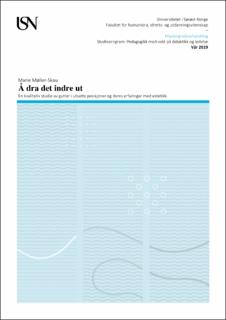| dc.description.abstract | Denne masteroppgaven undersøker gutter i utsatte posisjoner og deres erfaringer med
estetikk. Formålet med oppgaven er få kunnskap om hvordan estetikk kan innvirke i
unge gutters sårbare liv, og hvorvidt disse erfaringene har betydning for en
skolekontekst. Dette belyses gjennom to forskningsspørsmål: Hva forteller guttene om
erfaringer med estetikk i sitt personlige liv? Hva forteller guttene om erfaringer med
estetiske læreprosesser i en skolekontekst?
Oppgaven er skrevet innenfor et internasjonalt innovasjonsprosjekt ved navn MaCEMarginalisation
and Co-Created Education. Prosjektet har tilknytning til et longitudinelt,
lokalt forskningsprosjekt, kalt UNGSA- Ungdom, gjennomføring og skoleavbrudd i
Telemark. Begge prosjektene har databaser med kvalitative forskningsintervju av
henholdsvis 46 og 70 informanter. Dette utvalget består av seks gutter i utsatte
posisjoner, som befinner seg i aldersspennet mellom 17 og 21. To av guttene er
intervjuet av undertegnede og fire er intervjuet av forskere i UNGSA.
Studien tar utgangspunkt i en pragmatisk filosofi av Dewey, hvor erfaringer anerkjennes
som virkelig og sanne. Som metodologi har studien en kvalitativ, narrativ tilnærming
med vekt på informantens unike liv. Metoden som benyttes er et forskningsintervju
med indirekte tilnærming, og som analyseverktøy anvendes en narrativ analyse.
Analysen viser at guttenes erfaringer med estetikk kan ha betydning for en
skolekontekst. Dette innebærer at guttene berøres emosjonelt av estetikk i sine
personlige liv, og for fire av dem kan dette sees som medvirkende i deres engasjement
for estetiske læreprosesser i en skolekontekst. Hos de to mest sårbare guttene, med
mange negativer erfaringer fra skolen, er et slikt engasjement fraværende. Slik sett taler
det for at det er mulig å bygge bro mellom det personlige liv og en skolekontekst, men
at det finnes elementer som hemmer disse overgangene.
På bakgrunn av teori og forskning med hovedvekt på estetikk, skoleavbrudd,
skoleengasjement og tilnærmingen læringsliv, drøftes funnene ytterligere. Drøftingen
viser at funnene synes å være i tråd med den presenterte teorien.
ABSTRACT: This master thesis examines young boys in vulnerable positions and their experiences
with aesthetic. The aim is to gain knowledge on how aesthetic interacts in young boys`
vulnerable lives, and whether these experiences affect them in a school context. This is
examined through the following two research questions: What do the boys tell about
aesthetic experience in their personal life? What do the boys tell about their aesthetic
experiences in a school context?
The thesis is written within an international innovation project, named Marginalisation
and Co-Created Education. The project is connected to a local, longitudinal study, called
Youth, Completion and Dropout in Telemark. Both projects have databases with
qualitative research interviews of respectively 46 and 70 informants. My selection
consists of six boys at the age of 17 to 21. Two of them is interviewed by the author and
four of these boys is gathered from Youth, Completion and Dropout in Telemark.
The study is based on Dewey’s pragmatic philosophy, where experience is recognized as
real and true. As a methodology the study has a qualitative, narrative approach, which
focus on the unique life of each informant. The stories are gathered through an indirect
approach and the study uses a narrative analysis.
The analysis shows that the boys` aesthetic experience can affect them in a school
context. This means that the boys get emotional touch by aesthetic in their personal
life, and for four of these boys, this seems to contribute to their engagement in these
kinds of subjects at school. For two of the most vulnerable boys, who had too many
negative experiences with school, this engagement doesn´t exist. Therefor it seems to
be possible to make transitions between the personal life and a school context, but that
there are elements that might inhibit those transitions.
The findings from the analysis is discussed through theories and research with emphasis
on aesthetic, drop out, school engagement and the approach learning lives. The
discussion seems to correlate with the theory that has been represented. | en_US |
